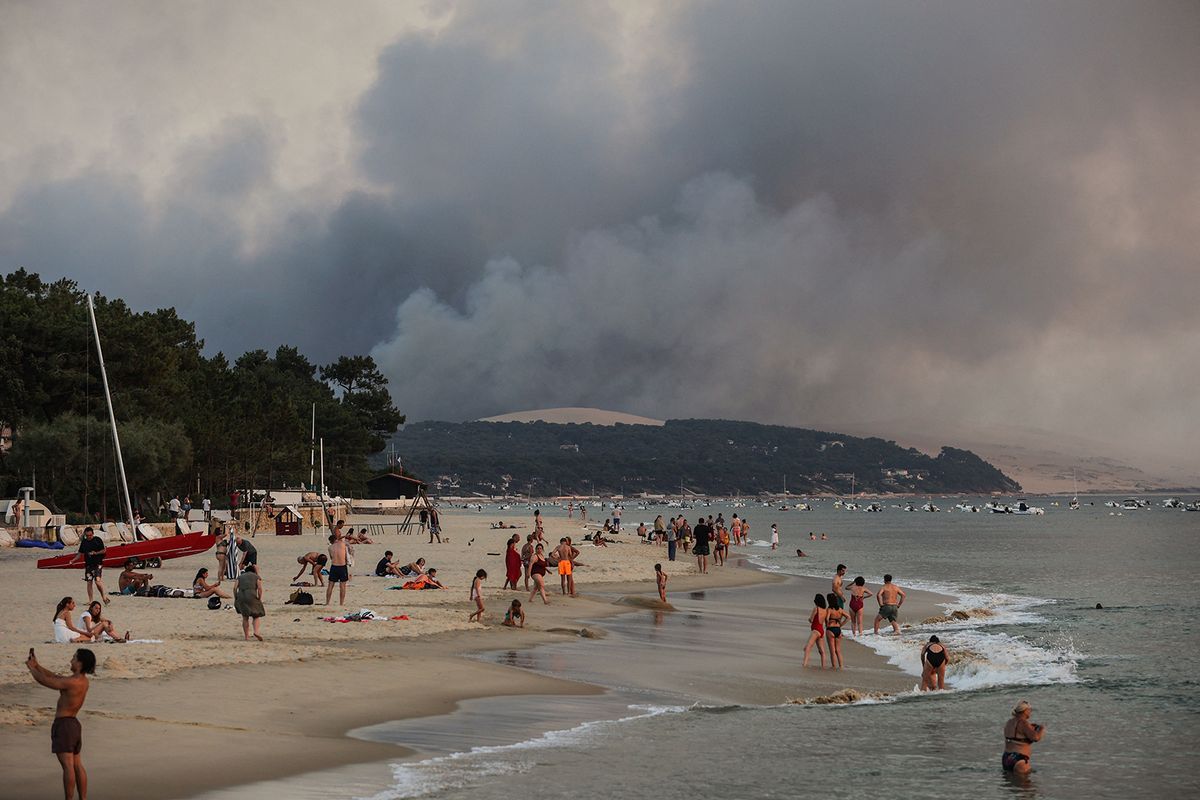British rails buckle under record heat in Europe’s summer of woe

Travelers in Britain were warned to stay home rather than risk a ride on rails that could buckle under record temperatures as brutal conditions swept through Europe.
Train companies offered refunds and ticket swaps, and Network Rail told passengers on Tuesday not to travel north out of London to a weather “red zone.”
A temperature of 102 degrees Fahrenheit was recorded at Charlwood, Surrey, according to the Met Office, which warned that temperatures would likely rise further. That would break the previous record of 38.7 degrees set on July 25, 2019.
The current heat wave has sparked deadly wildfires in Spain, Portugal and France, adding to the challenges facing Europe from political upheaval to travel chaos and surging prices. Russia’s war in Ukraine provides a grim backdrop and increases anxiety about the weather’s impact on food production.
The hot and dry conditions have caused an area roughly equivalent to the combined size of New York’s boroughs of Brooklyn and Queens to burn over the past 10 days, while more than 600 people have died across the region.
Increasingly frequent and intense heat waves are the result of climate change, and temperatures this extreme are set to become more common as the world continues to burn fossil fuels.
Brutal conditions have already struck India, the U.S. and western Europe this year, but pose a particular challenge to regions unaccustomed to scorching temperatures like the UK. Ireland also posted its highest temperature in more than a century on Monday.
Here’s a roundup of some of the countries hit hardest in Europe’s current heat wave:
UK
Britain’s network operator said it measured rail temperatures of 62 degrees Celsius (143 Fahrenheit) in Suffolk on Monday and said tracks could “expand, bend and break” under the stress of the extreme conditions.
The train issues spilled over to the struggling aviation sector with services to Luton and Gatwick airports canceled on Tuesday. Luton was again operational after runway repairs halted flights on Monday.
Transport for London told people not to travel and suffered severe delays due to heat-related restrictions on a number of lines of the London Tube, including the Central and District lines. The Hammersmith & City line was suspended entirely because of heat.
Daily life has been disrupted across usually temperate Britain. The Met Office issued its first ever red emergency warning for extreme heat for Monday and Tuesday, warning of the potential for power outages, road closures and even loss of life. It has also extended its most severe warning for the risk of fires over most of England Tuesday.
Temperatures should start to ease later Tuesday as cooler weather moves in from the west. The biggest relief should come Wednesday evening when temperatures drop to the low 20s Celsius — around average for the season.
France
Forest fires continued to rage in southwestern France on Tuesday, with Paris set to exceed 40 degrees Celsius (104 Fahrenheit).
More than 34,000 people have been evacuated from their homes in the past week in the Gironde region where 19,300 hectares have burned so far, according to regional authorities. Hundreds of animals had to be moved to safety as flames came closer to a zoo in Bassin d’Arcachon, near the Atlantic coast.
Authorities warned there was a high risk of further fires in the southeast of the country later this week with the expected arrival of the Mistral wind in the Rhone valley.
Among places that saw record temperatures at the start of the week, Brest, on the tip of Brittany on the northwestern coast, smashed a previous high of 35.1 Celsius, reaching 39.3 degrees on Monday, according to Meteo France.
Italy
Amid an extreme drought — which has caused the Po river to drop to its lowest level in 70 years — officials are warning of risks to food production.
“Water for agriculture is running out,” Attilio Fontana, governor of Lombardy region around Milan, told Italian news agency Ansa. While the Maggiore, Garda and Como lakes still have some reserves, farms may be cut off “if rain doesn’t fall in coming days.”
Italy’s health ministry said at least nine Italian cities, including Rome and Florence, will be on “red alert” on Wednesday, with temperatures regarded as a serious threat to the health of the entire population and not merely of the most vulnerable.
Volunteers from the Progetto Arca foundation are monitoring the streets of Milan, Rome, Naples, Bari, Turin and Varese with mobile kitchens to bring fresh water and nutritious meals to homeless and vulnerable residents. Anti-heat kits include personal hygiene products, fresh and clean changes.
Netherlands
Dutch supermarket chain Albert Heijn said it will cancel all grocery deliveries from 2 p.m. local time Tuesday because of expected high temperatures.
The company doesn’t “consider it responsible to let our delivery workers work in these weather conditions,” a spokesperson told Bloomberg. The company, owned by Ahold Delhaize, said the normal delivery schedule will resume Wednesday.
The Netherlands’s meteorology institute declared code orange, warning the southern and central parts of the country “will be very hot.” Amsterdam is forecast to hit 37 degrees Celsius on Tuesday.
Portugal
Two elderly people were found dead inside a burnt car in the area of one of the large fires in northern Portugal, according to news agency Lusa. The country has suffered over 200 more deaths than normal since the start of the latest heatwave.
But there are signs of progress. The wildfires have eased since last week. Still, as of 8 a.m. on Tuesday there were two large blazes in the north of the country, with almost 800 firefighters seeking to contain them.